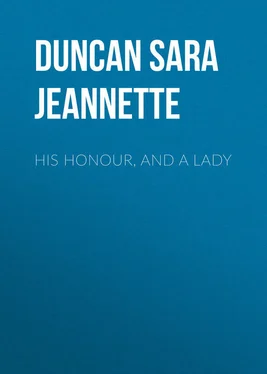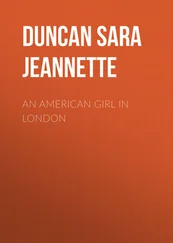Sara Duncan - His Honour, and a Lady
Здесь есть возможность читать онлайн «Sara Duncan - His Honour, and a Lady» — ознакомительный отрывок электронной книги совершенно бесплатно, а после прочтения отрывка купить полную версию. В некоторых случаях можно слушать аудио, скачать через торрент в формате fb2 и присутствует краткое содержание. Жанр: foreign_antique, foreign_prose, на английском языке. Описание произведения, (предисловие) а так же отзывы посетителей доступны на портале библиотеки ЛибКат.
- Название:His Honour, and a Lady
- Автор:
- Жанр:
- Год:неизвестен
- ISBN:нет данных
- Рейтинг книги:5 / 5. Голосов: 1
-
Избранное:Добавить в избранное
- Отзывы:
-
Ваша оценка:
- 100
- 1
- 2
- 3
- 4
- 5
His Honour, and a Lady: краткое содержание, описание и аннотация
Предлагаем к чтению аннотацию, описание, краткое содержание или предисловие (зависит от того, что написал сам автор книги «His Honour, and a Lady»). Если вы не нашли необходимую информацию о книге — напишите в комментариях, мы постараемся отыскать её.
His Honour, and a Lady — читать онлайн ознакомительный отрывок
Ниже представлен текст книги, разбитый по страницам. Система сохранения места последней прочитанной страницы, позволяет с удобством читать онлайн бесплатно книгу «His Honour, and a Lady», без необходимости каждый раз заново искать на чём Вы остановились. Поставьте закладку, и сможете в любой момент перейти на страницу, на которой закончили чтение.
Интервал:
Закладка:
CHAPTER II
“Here you are at last!” remarked Mrs. Daye with vivacity, taking the three long, pronounced and rustling steps which she took so very well, toward the last comer to her dinner party, who made his leisurely entrance between the portières , pocketing his handkerchief. “Don’t say you have been to church,” she went on, holding out a condoning hand, “for none of us will believe you.”
Although Mr. Ancram’s lips curved back over his rather prominent teeth in a narrow smile as he put up his eyeglass and looked down at his hostess, Mrs. Daye felt the levity fade out of her expression: she had to put compulsion on herself to keep it in her face. It was as if she, his prospective mother-in-law, had taken the least of liberties with Mr. Ancram.
“Does the only road to forgiveness lie through the church gate?” he asked. His voice was high and agreeable; it expressed discrimination; his tone implied that, if the occasion had required it, he could have said something much cleverer easily – an implication no one who knew him would have found unwarrantable.
“The padres say it does, as a rule, Ancram,” put in Colonel Daye. “In this case it lies through the dining-room door. Will you take my wife in?”
In a corner of the room, which she might have chosen for its warm obscurity, Rhoda Daye watched with curious scrutiny the lightest detail of Mr. Lewis Ancram’s behaviour. An elderly gentleman, with pulpy red cheeks and an amplitude of white waistcoat, stood beside her chair, swaying out of the perpendicular with well-bred rigidity now and then, in tentative efforts at conversation; to which she replied, “Really?” and “Yes, I know,” while her eyes fixed themselves upon Ancram’s face, and her little white features gleamed immobile under the halo which the tall lamp behind her made with her fuzz of light-brown hair. “Mother’s respect for him is simply outrageous,” she reflected, as she assured the elderly gentleman that even for Calcutta the heat was really extraordinary, considering that they were in December. “I wonder – supposing he had not made love to me – if I could have had as much!” She did not answer herself definitely – not from any lack of candour, but because the question presented difficulties. She slipped past him presently on the arm of the elderly gentleman, as Ancram still stood with bent head talking to her mother. His eyes sought hers with a significance that flattered her – there was no time for further greeting – and the bow with which he returned her enigmatic little nod singled her out for consideration. As she went in to dinner the nape of Mr. Lewis Ancram’s neck and the parting of his hair remained with her as pictorial facts.
Mrs. Daye always gave composite dinner-parties, and this was one of them. “If you ask nobody but military people to meet each other,” she was in the habit of saying, “you hear nothing but the price of chargers and the prospects of the Staff Corps. If you make your list up of civilians, the conversation consists of abuse of their official superiors and the infamous conduct of the Secretary of State about the rupee.” On this occasion Mrs. Daye had reason to anticipate that the price of chargers would be varied by the grievances of the Civil Service, and that a touring Member of Parliament would participate in the discussion who knew nothing about either; and she felt that her blend would be successful. She could give herself up to the somewhat fearful enjoyment she experienced in Mr. Ancram’s society. Mrs. Daye was convinced that nobody appreciated Mr. Ancram more subtly than she did. She saw a great deal of jealousy of him in Calcutta society, whereas she was wont to declare that, for her part, she found nothing extraordinary in the way he had got in – a man of his brains, you know! And if Calcutta resented this imputation upon its own brains in ever so slight a degree, Mrs. Daye saw therein more jealousy of the fact that her family circle was about to receive him. When it had once opened for that purpose and closed again, Mrs. Daye hoped vaguely that she would be sustained for the new and exacting duty of living up to Mr. Ancram.
“ Please look at Rhoda,” she begged, in a conversational buzz that her blend had induced.
Mr. Ancram looked, deliberately, but with appreciation. “She seems to be sufficiently entertained,” he said.
“Oh, she is! She’s got a globe-trotter. Haven’t you found out that Rhoda simply loves globe-trotters? She declares that she renews her youth in them.”
“Her first impressions, I suppose she means?”
“Oh, as to what she means – ”
Mrs. Daye broke off irresolutely, and thoughtfully conveyed a minute piece of roll to her lips. The minute piece of roll was Mr. Ancram’s opportunity to complete Mrs. Daye’s suggestion of a certain interesting ambiguity in her daughter; but he did not take it. He continued to look attentively at Miss Daye, who appeared, as he said, to be sufficiently entertained, under circumstances which seemed to him inadequate. Her traveller was talking emphatically, with gestures of elderly dogmatism, and she was deferentially listening, an amusement behind her eyes with which the Chief Secretary to the Government at Bengal was not altogether unfamiliar. He had seen it there before, on occasions when there was apparently nothing to explain it.
“It would be satisfactory to see her eating her dinner,” he remarked, with what Mrs. Daye felt to be too slight a degree of solicitude. She was obliged to remind herself that at thirty-seven a man was apt to take these things more as matters of fact, especially – and there was a double comfort in this reflection – a man already well up in the Secretariat and known to be ambitious. “Is it possible,” Mr. Ancram went on, somewhat absently, “that these are Calcutta roses? You must have a very clever gardener.”
“No” – and Mrs. Daye pitched her voice with a gentle definiteness that made what she was saying interesting all round the table – “they came from the Viceroy’s place at Barrackpore. Lady Emily sent them to me: so sweet of her, I thought! I always think it particularly kind when people in that position trouble themselves about one; they must have so many demands upon their time.”
The effect could not have been better. Everybody looked at the roses with an interest that might almost be described as respectful; and Mrs. Delaine, whose husband was Captain Delaine of the Durham Rifles, said that she would have known them for Their Excellencies’ roses anywhere – they always did the table with that kind for the Thursday dinners at Government House – she had never known them to use any other.
Mrs. St. George, whose husband was the Presidency Magistrate, found this interesting. “Do they really?” she exclaimed. “I’ve often wondered what those big Thursday affairs were like. Fancy – we’ve been in Calcutta through three cold weathers now, and have never been asked to anything but little private dinners at Government House – not more than eight or ten, you know!”
“Don’t you prefer that?” asked Mrs. Delaine, taking her quenching with noble equanimity.
“Well, of course one sees more of them,” Mrs. St. George admitted. “The last time we were there, about a fortnight ago, I had a long chat with Lady Emily. She is a sweet thing, and perfectly wild at being out of the school-room!” Mrs. St. George added that it was a charming family, so well brought up; and this seemed to be a matter of special congratulation as affecting the domestic arrangements of a Viceroy. There was a warmth and an emphasis in the corroboration that arose which almost established relations of intimacy between Their Excellencies and Mrs. Daye’s dinner-party. Mrs. Daye’s daughter listened in her absorbed, noting manner; and when the elderly gentleman remarked with a certain solemnity that they were talking of the Scansleighs, he supposed, the smile with which she said “Evidently” was more pronounced than he could have had any right to expect.
Читать дальшеИнтервал:
Закладка:
Похожие книги на «His Honour, and a Lady»
Представляем Вашему вниманию похожие книги на «His Honour, and a Lady» списком для выбора. Мы отобрали схожую по названию и смыслу литературу в надежде предоставить читателям больше вариантов отыскать новые, интересные, ещё непрочитанные произведения.
Обсуждение, отзывы о книге «His Honour, and a Lady» и просто собственные мнения читателей. Оставьте ваши комментарии, напишите, что Вы думаете о произведении, его смысле или главных героях. Укажите что конкретно понравилось, а что нет, и почему Вы так считаете.












